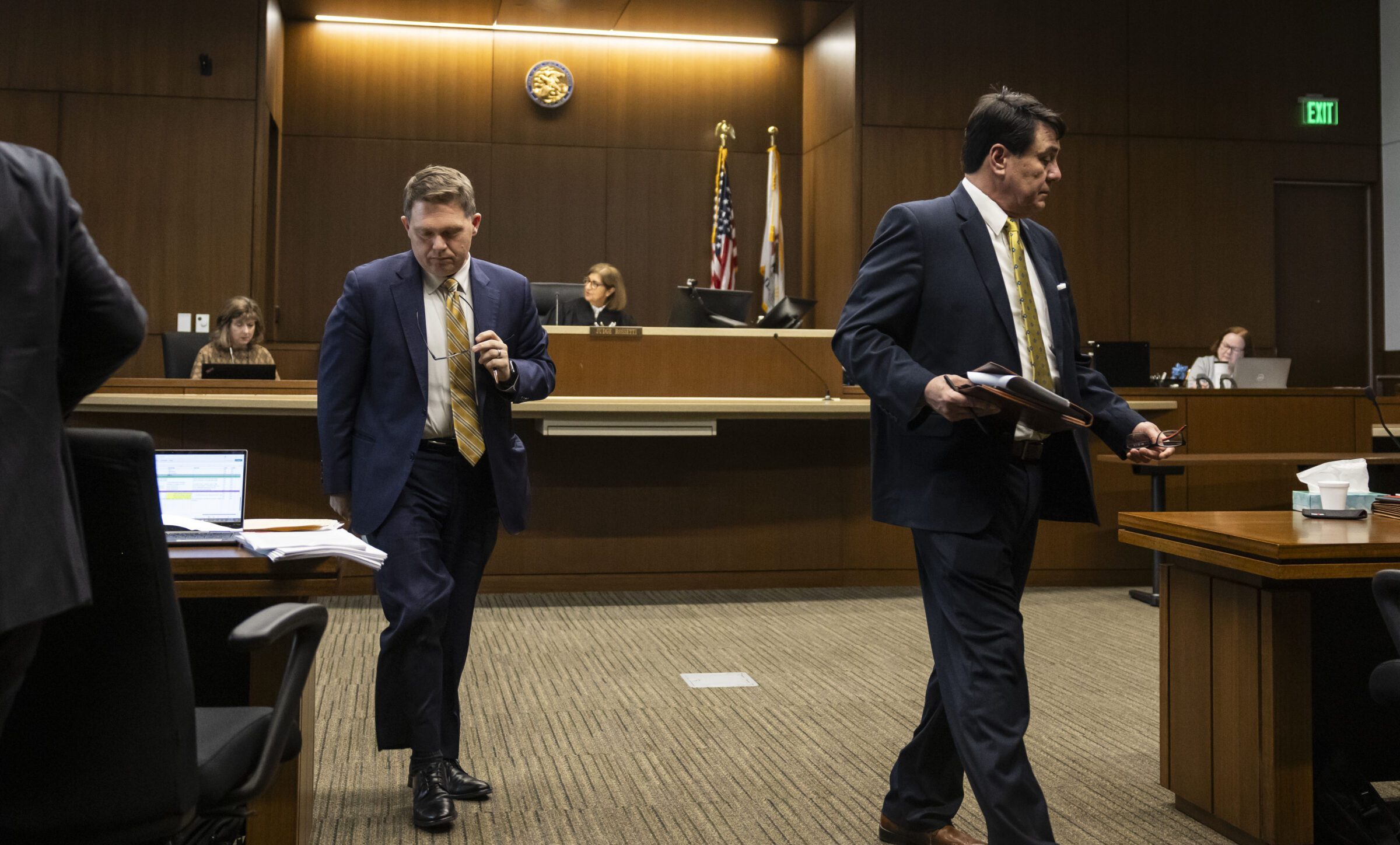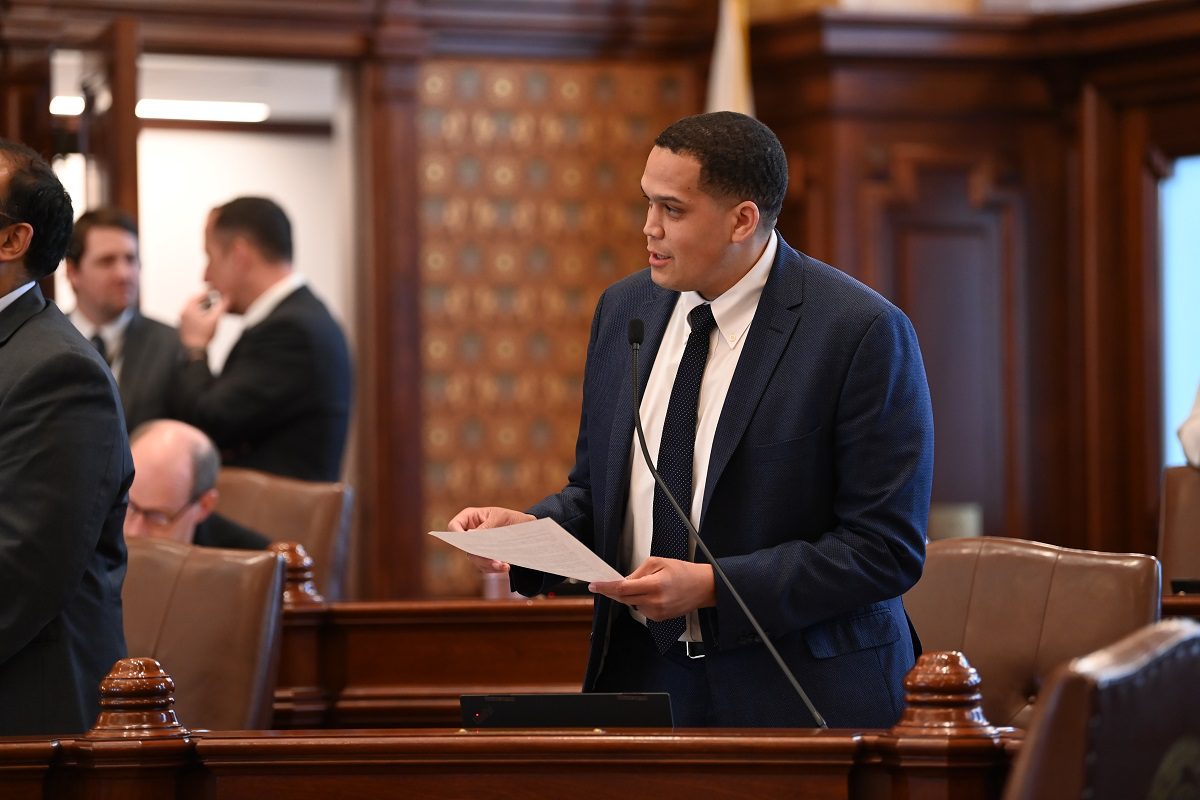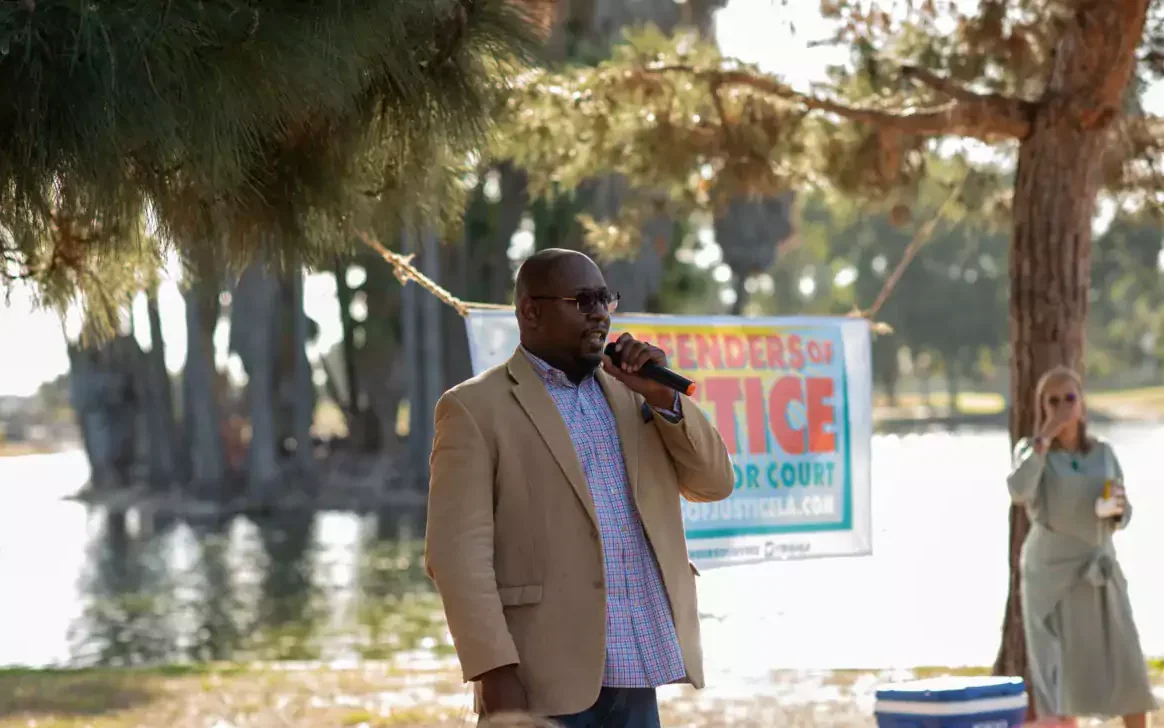This Illinois Reform May Bring Relief to Overworked Public Defenders
Public defenders have "nowhere to go for help," at the mercy of floundering local budgets and local prosecutors’ policy swings. Illinois is creating a statewide office to change that.
| July 11, 2025

Chicago’s public defenders are among the best-resourced in Illinois, but even there, massive case loads have attorneys and investigators stretched paper-thin.
The Cook County Jail has swelled under the county’s new top prosecutor, increasing roughly 10 percent so far this year. State’s Attorney Eileen O’Neil Burke, who came into office in December promising a more punitive approach to public safety, has reversed reforms ushered in by her predecessor and pushed courts to jail more people ahead of trial, shifts that have weighed heavily on the public defenders representing the accused.
As local prosecutors have sought to detain more people pretrial this year, attorneys have scrambled to review evidence and prepare a defense in cases that the state previously would have been unlikely to contest.
“It is clear that our office needs more attorneys,” said Sharlyn Grace, senior policy advisor for the public defender’s office in Cook County. “When we compare every public defense office in the state to any national standard, no one has enough lawyers, investigators, paralegals or support staff.”
Public defenders throughout Illinois are feeling a similar crunch, with significant understaffing that undercuts their ability to win their cases. The Illinois constitution guarantees each defendant a right to effective legal representation, but the quality of legal defense varies greatly depending on the circumstances within the county. In the Chicago area, the new prosecutor’s policy swing has heaped onto the workload of defense attorneys without additional resources to meet the challenge. Outside the city, public defense funds are constrained by limited property tax revenue and part-time staff. And since Illinois did away with money bond in 2023, the state’s new approach to deciding whether people are detained pretrial has created a lot more demand on public defenders across the board.
There may be some relief on the horizon for overworked and understaffed public defenders. The Illinois legislature in May adopted the State Public Defender Act, known to its supporters as the FAIR Act, to establish a statewide public defender’s office. It passed nearly entirely on party lines, with Democrats in support, and now sits on the desk of Democratic Governor J.B. Pritzker.
Sign up and stay up-to-date
Until now, Illinois has had no clear way to measure and identify the issues public defenders face, let alone address them. It’s one of only a few states where responsibility for public defense rests entirely at the local level, so Illinois has never had any mechanism for monitoring and supporting public defense across its 102 counties.
“It is just assumed that public defenders are just supposed to be overworked and understaffed until we burn out and can’t take it anymore, until we are replaced with someone with energy who does it until they burn out,” Champaign County Public Defender Elisabeth Pollock told Bolts. “It’s a continuous cycle of never having enough resources.”
This new office set up by the FAIR Act would oversee public defender offices around the state. It’d be tasked with tracking each county’s needs and setting workload standards.
It would allow the state to create regional support hubs and to supply small, rural counties with expert witnesses and specialized attorneys for odd cases that locals aren’t equipped to handle, and with additional trial attorneys to step in as needed to ensure offices are adequately staffed.

This will all take time: The office wouldn’t be created until 2027, and even that would only trigger a yearslong process to assess the gaps in Illinois’ public defense systems. Still, the advocates and public defenders who championed the FAIR Act see it as a critical reform.
Eric Rinehart, the Democratic state’s attorney of Lake County and a rare prosecutor in Illinois who has supported the state’s criminal justice reforms, thinks the FAIR Act can improve due process for defendants. “The public defender system should be fully funded, and we should get them more resources,” he told Bolts.
He added, “You want your public defender system to be strong. That is how we get to justice and make sure we don’t make mistakes.”
Long hours and heavy caseloads are making it tough for the Champaign County public defender’s office to compete with private firms and better-resourced government jobs. When attorneys leave for better pay or simply a more sustainable work-life balance, Pollock said, her office loses out on the expertise that comes with years of experience.
Currently, this office is fully staffed with the attorneys and investigators allocated in the county budget, but “it is still a struggle to get the work done in the necessary timeframe,” Pollock said. “It is a constant battle to keep people physically and emotionally healthy enough to do this work.” Champaign County has only half the defense attorneys it would need to handle the more than 5,000 cases its office receives each year, according to data compiled by Northwestern University researchers. In most of the state’s rural counties, many of which contract with private attorneys rather than employ full-time public defenders, the discrepancy is far greater.
When she wants to get these issues addressed, though, Pollock isn’t sure where to turn. “Part of the issue in Illinois is that we are one of just a few places where there is no statewide office,” she said. “When we are trying to advocate for budget increases, or access to expert witnesses or specialized counsel, there is no way to fulfill our constitutional obligations and nobody to go to for help.”
The Champaign County Board has stepped in to attempt to allocate some additional resources in the past, she says, but that only goes so far as local governments face tight budgets all around the country. Last year, the board put a proposed sales tax measure on the ballot that would fund public safety departments, with the public defender’s office included alongside the county’s law enforcement forces. Voters rejected the tax increase,
For Trisha Crowley, president emerita of the League of Women Voters of Champaign County, that loss underscored the sheer difficulty of trying to salvage public defense county by county, without a statewide advocate there to fight on behalf of public defenders.
“You have 102 county boards that decide what the public defender’s budget is. When funding is based at the county level, it’s always going to be erratic and tied to totally unrelated items like a tax loss. When the budget pinches, that’s one of the first things that gets cut.”
“This obligation to represent the indigent, it is a state constitutional obligation,” says Pollock. “It is not supposed to be on the counties, and yet the counties have become responsible for fulfilling these state rights. But county resources depend entirely on where you are located, whether or not there is money in your county based on property taxes.”

Criminal justice reform advocates in Illinois rallied in support of a more unified system after a report published by the Sixth Amendment Center in 2021 spotlighted how the state’s unregulated approach was harming defendants’ constitutional right to legal counsel. Based on an evaluation of nine counties in Illinois, the study found that all offices far exceeded the national caseload standards for public defense offices, hindering the ability of attorneys to investigate cases and prepare adequate defenses.
The report underscored tremendous geographic inequalities and advised Illinois to adopt oversight mechanisms to even out those disparities.
The FAIR Act implements those recommendations by establishing a new office that’ll have to track caseloads and performance standards across all counties in Illinois.
Grace expects the focus to be on rural areas and smaller cities with less funding for public defenders, but the lack of clear information about what public defenders are up against makes it difficult to predict how the state office will eventually tackle these challenges. “There’s no one who knows how many public defenders there are in the state, or how many cases we have.”
Once it has gathered data that reflects the burden each county faces, the state public defender’s office would have the authority to distribute some funds to individual counties to close disparities, though this budget would have to be worked out in future legislative sessions.
The office would act as an advocate to get additional funds from the state legislature to close the gaps.
“Having a statewide office is going to give us a way to advocate for our needs as a whole,” said Pollock. “Just having an advocate, having somebody to unite the counties and look at the data and even out some of the disparities.”
Many public defenders supported the landmark reform that ended cash bail in Illinois in 2023, despite knowing the new system would add considerably to their workload.
Before bail reform, when prosecutors wanted to keep someone in jail pretrial, courts held a bond hearing that was typically just a few minutes, where the judge set a monetary amount the defendant would have to pay to be released. Bonds were typically based on the severity of the charges, and defendants had little opportunity to challenge accusations or contest evidence.
Once Illinois implemented the Pretrial Fairness Act in 2023, the rules changed: Under the new system, the hearings that determine whether someone will be held pretrial are a lot more involved. Now prosecutors have to establish with “clear and convincing evidence” that a person is either a danger to the community or a flight risk in order to jail someone. And the added diligence has fallen on public defenders as well; they’re now allowed to see the arrest report ahead of time, review the evidence behind the charges, and respond to the state’s case for why a person should be detained.
The more intensive process has made the system fairer, says Cathy MacElroy, the chief public defender in St. Clair County, near the border with Missouri. “It should have always worked this way … if someone is being detained, it should really be challenged in front of a judge. But the workload is hard to manage since the hearings must happen soon after a person is arrested.
“It forces us to stop and handle those detention matters right away,” she said. “I might have 20 cases, but instead of working on those, I have to triage. It stops any semblance of control we had over our own timelines and management of our own cases.”
The Pretrial Fairness Act earmarked $10 million for a public defense grant program to deal with the surge in caseloads, but that sum did not close the gaps public defenders have long denounced. It also didn’t solve the court system’s fragmentation in 102 counties.

The 2023 reform also left public defenders’ caseload at the mercy of their local state’s attorney. Under the new law, prosecutors have a great deal of power to decide how frequently to seek pretrial detention; courts consider detention only if a prosecutor asks for it and triggers one of these intensive hearings.
Rob Deters, a private defense attorney, practices in both Lake County and McHenry County, two neighboring counties in the Chicago suburbs, and he says the difference across county lines has been palpable. In McHenry County, he says prosecutors have sought pretrial detention aggressively. The county was led until late last year by a Republican state’s attorney, Patrick Kennealy, who told Bolts in 2024 that he was seeking pretrial detention in every single eligible case. Kennealy’s successor, Republican Randi Freese, told Bolts in a statement this week that her office does not have such a blanket policy and makes decisions case-by-case; Deters told Bolts he has not seen a decrease in the volume of petitions.
Local judges have responded by rejecting over half of detention petitions, according to data from the Clerk of the McHenry County Circuit Court; that’s among the highest rates in Illinois. “Their rejection rates are higher because they’re filing in cases that do not merit detention, most likely to prove a political point, rather than for public safety,” said Deters.
In Lake County, though, the chief prosecutor, Rinehart, has been an ally to bond reform advocates, and Deters finds that prosecutors there are “more judicious” about seeking detention and triggering hearings in low-level cases like drug use and property damage. Rinehart reasserted his support for bail reform in an interview with Bolts, adding, “A prosecutor must look at every single case and make a decision not based on a political grievance with bail reform but rather look at a human being who has a right to a fair process.”
Grace, the policy adviser to the Cook County public defender, has also witnessed the effects of prosecutors’ policies with the changeover from Kim Foxx, Chicago’s reform-minded prosecutor from 2016 to 2024, to Burke, who has taken a more aggressive approach to pretrial detention.
The number of detention hearings has increased by 69 percent over the first six months of 2025 compared to the same period last year, when Foxx was in office, according to county data.
This surge is making public defenders spend more time at these hearings for relatively minor cases, Grace said, cutting down on the resources they can devote to each defendant. “It threatens a return to the assembly-line justice that the state made a decision to move away from,” she told Bolts.
“Our office is committed to ensuring that our prosecutors present all relevant information to the court so that judges can make informed, independent decisions regarding detention,” Burke’s office said in a statement to Bolts. “Our detention filings are guided by the law and focused on public safety, not volume.”
If Pritzker signs the FAIR Act, advocates hope it can help make public defenders more resilient to these policy swings, since the new statewide office is meant to track local circumstances and respond to each county’s burden. It could eventually allocate resources based on all the factors that shape caseloads, rather than leaving offices dependent on local budgets.
“What we have now is justice based on geography, where different counties have wildly different resources,” Grace said. “We need sufficient resources based on local need.”
Sign up and stay up-to-date
Support us
Bolts is a non-profit newsroom that relies on donations, and it takes resources to produce this work. If you appreciate our value, become a monthly donor or make a contribution.




